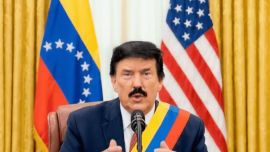Argentina has met the targets of its International Monetary Fund (IMF) credit programme by "significant margins," according to a senior IMF official.
The comments, said last Friday, come weeks before President Javier Milei’s government faces the eighth quarterly review of the US$44.5-billion loan deal.
With half the population living in poverty, Milei faces demonstrations at home over his deep austerity programme, but thousands of miles away in Washington, he is reaping praise for his fiscal adjustment.
The IMF believes that its policy is bearing fruit.
Milei’s stabilisation plan "has yielded better results than we expected in our last programme review," said Rodrigo Valdés, the IMF's director for Latin America and the Caribbean, at a press conference.
"We have the first fiscal surplus in a decade, reserves are steadily rebuilding ... the Central Bank's balance sheet is strengthening and inflation, while still high, is coming down faster than we anticipated," he added.
Valdés said preliminary information available up to March indicated that “key targets” of the programme were being met by “significant margins.”
The Chilean economist was optimistic about the eight review of Argentina’s programme, which is scheduled for May and would allow for the disbursement of US$800 million.
Valdés and other Fund officials recently met with Argentine authorities in Buenos Aires, as well as of the IMF and World Bank spring meetings, which were held in Washington this week.
"Our discussions focused on policies to improve the quality and durability of the fiscal adjustment" and "how best to adjust Central Bank policies to continue to reduce inflation and rebuild reserves," Valdés revealed.
Milei, who defines himself as an “anarcho-capitalist,” is also proud of his administration’s economic results. He plans to address the nation on Monday in a prime-time speech dedicated to the topic.
"This government has made the largest fiscal adjustment in humanity," he declared Friday at a forum with business leaders in Bariloche, southern Argentina.
"The 15 percent of GDP that was previously taken by the state in fiscal deficit for parasitic activities is returning to the private sector for productive investment," said Milei, who has implemented a "chainsaw" plan to cut government spending.
Economy Minister Luis Caputo, one of Milei’s most important figures, travelled to Washington with other officials in search of new funds.
Milei wants an additional US$15 billion to allow him to eliminate Argentina’s ‘cepo,’ the word used to refer to strict currency controls that limit access to dollars in a country where the greenback is a safe haven for savings.
Valdés did not answer questions as to whether the IMF will grant more funds to Argentina. The nation’s economy will shrink by 2.8 percent this year, according to the multilateral lender’s latest forecast.
As for what is the ideal exchange rate, the economist said it is “very difficult” challenge for all governments.
"But what I can say is that it is fundamental that in the end policies are consistent, and that includes a level of the real effective exchange rate ... to safeguard in a lasting way stability and the accumulation of reserves," added Valdés.
– TIMES/AFP


























Comments